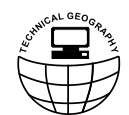Geographia Technica, Vol 19, Issue 2, 2024, pp. i-vi
GEOGRAPHY'S FUTURE IS TECHNICAL
- a letter from the editor -
Ionel HAIDU 
ABSTRACT: Geography has evolved from a descriptive discipline, based on exploration and mapping, to a technical and analytical science, capable of offering solutions to the complex challenges of the modern world. The transition towards a technical Geography was facilitated by the introduction of advanced statistical methods and new technologies such as GIS, remote sensing, LIDAR, UAV, etc. Autocorrelation and frequency are core concepts of the new Geography but they are common also in research from technical fields such as Engineering or Physics, which clearly proves that Geography is based on technical foundations similar to those used in other applied sciences. However, in certain states, Geography did not sufficiently adopt these tools, which led to a decrease in its relevance. In order to regain its significance, Geography must become a prospective science, capable of anticipating and manage natural and social phenomena. Universities promoting technical Geography are ready to train future leaders, while those that remain anchored in classical approaches risk becoming irrelevant. Geography’s future is therefore inextricably linked to the integration of advanced technologies and analytical methods
Keywords: GIS, Remote Sensing, LIDAR, UAV, Autocorrelation, Frequency, Antefactum science, Geographia Technica, Technical Geography, Future of Geography, Technical integration

 Full article here
Full article here